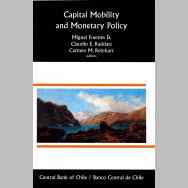Volumen 18: Capital Mobility and Monetary Policy
Publicaciones
Volumen 18: Capital Mobility and Monetary Policy
Descripción
The papers that comprise the different chapters of this volume were presented in the XVII Annual Conference on Central Banking that took place at the Central Bank of Chile, Santiago, during November 14 and 15, 2011.
While the global economic environment has changed considerably from the end of 2011 to the present for advanced and emerging economies alike, the themes and policy issues addressed by these papers share a timeless dimension. Collectively, the studies that comprise this volume deal with various aspects of the causes, consequences, and policy challenges associated with the repeated boom-bust cycles that have characterized market economies throughout most of their history. The papers have a decided openeconomy focus and connect the prosperity-crisis-depression cycle to international capital flows and their impact on domestic and external indebtedness, currency fluctuations, and the banking sector; their connection to global factors, such as international interest rates, commodity prices and crises or turbulence outside the national borders is explored. While the analysis is tilted towards emerging markets, particularly in Latin America, the relevance of these topics for mature economies has been made plain by the Global Financial Crisis.
Editores: Miguel Fuentes D.; Claudio E. Raddatz; Carmen M. Reinhart.
Comentarios
With this volume, the Central Bank of Chile series solidifies its status as the go-to source for state-of-the-art research on exchange rates, capital flows, and the cross-border repercussions of nacional monetary policy makers. For aspiring and committed researchers alike, there is no better place to start.
Barry Eichengreen, George C. Pardee and Helen N. Pardee Professor of Economics and Political Science, University of California at Berkeley
Monetary theory is just beginning to wake up from a long slumber in which financial issues were largely ignored. This is worrisome because these issues are in a state of flux, and new crises cannot be discounted. Fortunately, this timely book comes to the rescue by focusing on empirical, theoretical and policy issues that involve capital flows and credit markets.The authors are well-seasoned researchers, and spare no resources in bringing the reader to the cutting edge of the field. I enthusiastically recommend this book to all interested parties, especially policymakers.
Guillermo Calvo, Professor of Economics, International and Public Affairs, Columbia University
Events in international financial markets since the global financial crisis have led to a re-evaluation of long held views on the internacional policy trilemma, flexible exchange rates, and the appropriate focus for domestic monetary policy. The papers in this volume offer some profound new insights finto the new 21st Century environment of capital flows and internacional policy interdependence.The papers offer a number of different perspectives on the role of macroprudential policy and its relationship to capital flows, the source of financial fragility, the need for capital controls and a host of other pressing issues. Taken together however, they will be required reading for researchers and policy practitioners concerned with the future of the internacional financial system.
Michael Devereux, Professor of Economics, University of British Columbia
Volumen 18: Capital Mobility and Monetary Policy
Recuadros y gráficos

